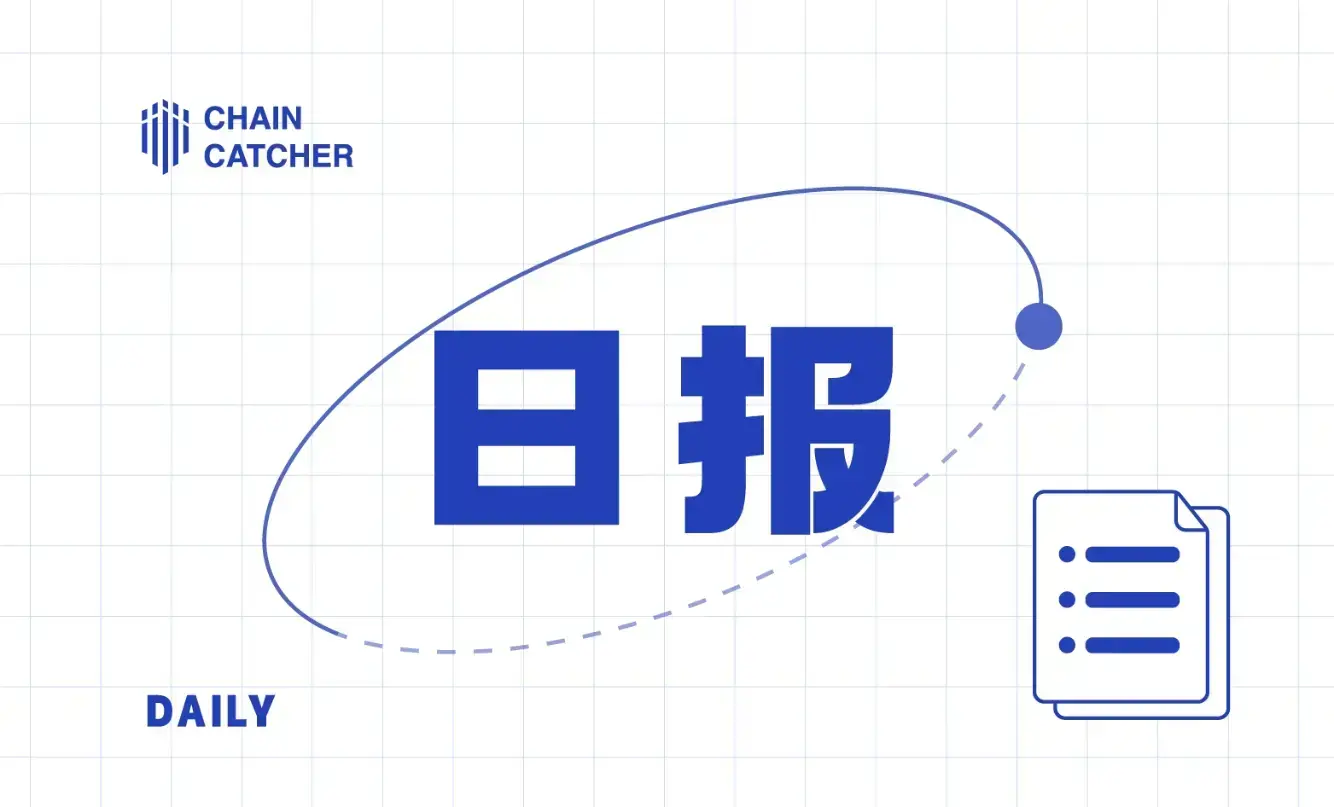Daily Report | Zilliqa launches the Jasper prototype testnet for Zilliqa 2.0; Vitalik: Plans to only publicly mention L2 projects that are in phase 1+ starting next year; Binance announces the launch of BNSOL, allowing SOL tokens to be staked in exchange for BNSOL as a reward
Organizer: Luan Peng, ChainCatcher
Important News:
- Binance announces the launch of BNSOL, allowing SOL tokens to be staked for BNSOL as rewards
- Scam Sniffer: Cryptocurrency users need to be wary of the malware Fato Reader
- Data: Bitcoin whale trading volume has significantly decreased since the peak in March
- Data: The trading volume of 6 Hong Kong virtual asset ETFs today is approximately HKD 8.5065 million
- Zilliqa launches the Jasper prototype testnet for Zilliqa 2.0
- Uniswap founder: Uniswap Labs and the foundation do not charge fees for protocol deployment
- Vitalik: Plans to only publicly mention L2 projects at stage 1+ starting next year
- Solana yield optimization protocol Carrot completes $600,000 Pre-seed funding, with participation from DKS Ventures and others
"What important events happened in the past 24 hours"
Binance announces the launch of BNSOL, allowing SOL tokens to be staked for BNSOL as rewards
Binance has announced the launch of BNSOL (Binance SOL Staking) service. Users can stake SOL to receive the liquid staking token BNSOL, which allows them to earn staking rewards while being flexible for use in Binance products and external DeFi platforms.
BNSOL accumulates staking rewards through a conversion ratio, and its value will gradually exceed an equivalent amount of SOL over time. Users can redeem BNSOL at any time, supporting standard redemptions and market instant trades.
Additionally, BNSOL is compatible with the Binance Web3 wallet and can be integrated with multiple Solana ecosystem projects such as Kamino, Drift, and Orca, aiming to provide users with more SOL staking options while increasing liquidity in the Solana ecosystem.
Scam Sniffer: Cryptocurrency users need to be wary of the malware Fato Reader
Scam Sniffer posted on the X platform stating that a malware named Fato Reader has been detected, targeting cryptocurrency users. Due to the malware, cryptocurrency theft cases have rapidly increased, and users need to remain vigilant.
Data: Bitcoin whale trading volume has significantly decreased since the peak in March
According to the latest data from blockchain analytics platform Santiment, the trading volume of Bitcoin whales has significantly decreased since Bitcoin reached its historical high in March. Santiment noted in a post on X on September 11: "Whale trading activity in cryptocurrency has noticeably declined since mid-August." Since Bitcoin hit a high of $73,679 on March 13, the weekly trading volume of Bitcoin worth $100,000 or more has decreased by 33.6%.
Santiment emphasized that this is not a bearish signal, as whale holders remain active throughout market bull and bear cycles. With market sentiment still in a state of "fear," investors are waiting for the next buying or selling opportunity.
Data: The trading volume of 6 Hong Kong virtual asset ETFs today is approximately HKD 8.5065 million
Hong Kong stock market data shows that as of the close, the trading volume of 6 Hong Kong virtual asset ETFs today is approximately HKD 8.5065 million.
Among them:
The trading volume of Huaxia Bitcoin ETF (3042.HK) is HKD 6.28 million;
The trading volume of Huaxia Ethereum ETF (3046.HK) is HKD 378,900;
The trading volume of Harvest Bitcoin ETF (3439.HK) is HKD 813,400;
The trading volume of Harvest Ethereum ETF (3179.HK) is HKD 222,600;
The trading volume of Bosera HashKey Bitcoin ETF (3008.HK) is HKD 735,600;
The trading volume of Bosera HashKey Ethereum ETF (3009.HK) is HKD 76,000.
Zilliqa launches the Jasper prototype testnet for Zilliqa 2.0
Zilliqa has announced the launch of the Jasper prototype testnet for Zilliqa 2.0, which promises to provide an efficient and scalable blockchain, aiming to make Web3 as easy to use as the internet. The release of Jasper is the first step in the Zilliqa 2.0 roadmap.
The Jasper prototype testnet introduces a new proof-of-stake consensus mechanism for Zilliqa 2.0, offering lightning-fast transaction speeds at low costs while remaining energy-efficient and scalable according to the needs of global enterprises and developers. This early version of the Zilliqa 2.0 network allows developers and validators to explore the enhanced features of the new network and try running validator nodes to earn rewards for helping secure the network.
Uniswap founder: Uniswap Labs and the foundation do not charge fees for protocol deployment
Uniswap founder Hayden Adams stated on X: "I rarely deal with projects that try to induce participation through forks; Uniswap Labs and the Uniswap Foundation do not charge fees for protocol deployment. Protocol deployment is done through governance voting, and we prioritize based on the activities and work required (for example, a new zk chain may require more work than a standard operational stack chain). We have put in a lot of work to reduce the workload required for each chain."
Vitalik: Plans to only publicly mention L2 projects at stage 1+ starting next year
Ethereum co-founder Vitalik Buterin stated on social media that starting next year, he plans to only publicly mention (in blogs, speeches, etc.) L2 projects that are at stage 1+, with a possible brief grace period for some genuinely interesting new projects.
Vitalik stated: "Regardless of whether I have invested or whether you are my friend, projects must reach stage 1 to be considered. Multiple ZK-rollup teams have told me they expect to reach stage 1 by the end of the year. I am very excited about this.
Of course, we should not easily abandon training wheels until we have real confidence in the security of the proof systems; doing so would be irresponsible. But stage 1 (75% of the council needs to cover the proof system, and 26%+ of council members must come from outside the rollup team) is a very reasonable moderate milestone. My multi-signature wallet has not experienced a single operational failure in years, let alone a 26% failure rate. The era of rollups as glorified multi-signature wallets is coming to an end. The era of crypto trust is about to arrive."
Solana yield optimization protocol Carrot has completed $600,000 in Pre-seed funding, with participation from BOOGLE, DKS Ventures, and angel investors Retired Chad Dev, DRiP founder vibhu, Nom, Kash Dhanda, ChartFu, Iced, and others.
According to RootData, Carrot is the simplest way to passively earn from Solana DeFi using a single token that offers the highest average returns. By continuously monitoring each lending protocol, it rebalances funds when better rates are available. Carrot ensures stablecoins achieve higher APRs faster, thereby efficiently optimizing returns.
Hong Kong is currently exploring whether to involve the Securities and Futures Commission (SFC) alongside Hong Kong Customs (C&ED) in regulating virtual asset over-the-counter (OTC) services.
According to insiders, the Hong Kong Securities and Futures Commission has sought industry opinions on possibly implementing a new licensing system for cryptocurrency OTC services, which would allow the securities regulator to collaborate with C&ED to oversee these companies, as discussions are private. According to a proposal made public in February, the planned OTC regulations and licenses were previously solely under C&ED's jurisdiction. OTC services facilitate direct and private large-scale cryptocurrency transactions between parties.
Insiders indicated that in recent months, the Hong Kong Securities and Futures Commission has also consulted companies about introducing a new licensing system for cryptocurrency custody services. They said discussions regarding these two licenses are still in the early stages and may change.
Blackstone Group: U.S. inflation has returned to the Federal Reserve's target
Blackstone Group CFO Michael Chae stated that the company "holds a cautiously optimistic view on a soft landing for the U.S.," indicating that this alternative asset management firm bets that the Federal Reserve's efforts to curb inflation will not trigger a recession in the U.S.
Blackstone's own inflation measure shows that U.S. inflation has reached 1.7%, excluding housing costs and including other relevant indicators. Chae stated this would bring the U.S. "to the Federal Reserve's inflation target."
Chae noted that data collected from Blackstone, the world's largest alternative asset management company, indicates that the labor market has been softening. CEOs of Blackstone's portfolio companies indicated in a June survey that they expect wage growth to slow next year. While the "revenue growth of Blackstone's global portfolio is slowing," these companies have shown "resilient profit margins."
Chae stated: "We are seeing signs of 'animal spirits' returning in the trading market. If these trends continue, I think this could lead to a particularly strong market in 2025."
Bernstein: Robinhood's market value is expected to rise 35% this year
According to DL News, Robinhood is committed to becoming a heavyweight in the cryptocurrency space. Robinhood is strengthening its crypto team, has launched crypto trading services in the EU, and has acquired the exchange Bitstamp for $200 million.
Bernstein analysts wrote in a report on Wednesday that these efforts will drive Robinhood's operating revenue to approximately $900 million in 2024, with its market value reaching between $19 billion and $23 billion by 2025. Robinhood is expected to achieve $3.4 billion in revenue in 2025. Bernstein noted that the company has already seen tailwinds, including demographic trends, with about 60% of Robinhood's assets coming from customers under 43 years old.
In the past decade, millennials have created about 1% of U.S. household wealth. As Robinhood increases its offerings of cryptocurrencies, stocks, derivatives, and savings products to younger demographics, this figure has risen to about 10%.
Crypto VC Reforge plans to raise $80 million, currently has raised $25 million
According to Bloomberg, Alexander Lin and Carl Hua have founded a new venture capital fund called Reforge, aiming to raise $80 million, of which $25 million has already been raised. Through Reforge, Lin hopes to find technologies that make it easier for founders and developers to adopt blockchain. He stated: "We believe that the current landscape of layer 1 blockchains does not meet the needs of the best consumer founders."
Additionally, Reforge co-founder Alexander Lin believes that capital allocators pushing for rapid token launches to gain returns is a major reason. He also criticized the overheated investment phenomenon in crypto and AI crossover startups and questioned the feasibility of decentralized computing networks meeting the power demands of AI tools.
It is reported that Lin and Carl Hua both held senior positions at Shima Capital until leaving in January this year to establish Reforge.
Previous news indicated that the founder of crypto VC Shima Capital is suspected of misappropriating assets, and several company executives have resigned. The founder Yida Gao created secret offshore entities and transferred assets belonging to his venture capital company to companies registered in his name, without the knowledge of other investors.
"What are the exciting articles worth reading in the past 24 hours"
How does the liquidity strategy platform Quantlytica simplify DeFi investment through AI technology?
DeFi once attracted countless users with the ideal of inclusive finance, promising to eliminate unfairness and opacity in the traditional financial system through technology. However, as the industry has developed, DeFi products have become increasingly specialized, and strategy design has become more complex, seemingly more suited for professional investors and institutions, leading many potential users to be blocked by high barriers to entry.
This trend of complexity not only deters ordinary users but also strays further from the original intention of inclusive finance. Simplifying the complex operations and strategy choices in DeFi applications, allowing more ordinary users to participate and benefit, has become a key issue for the industry's development.
The AI liquidity allocation strategy platform Quantlytica is dedicated to simplifying the process and experience of participating in DeFi, optimizing the investment experience through AI technology to meet the investment needs of ordinary users. The platform integrates multiple DeFi protocols and uses AI technology to horizontally compare data on returns, liquidity risks, and security across all DeFi projects, then provides various automated liquidity investment strategies based on different user needs.
In an interview with ChainCatcher, Quantlytica's Chief Product Officer (CPO) Wesley explained that Quantlytica is not a simple crypto asset management tool but a liquidity gateway in the crypto space, helping users deploy their asset liquidity into the crypto market while also attracting liquidity for projects. It is more like a systematic liquidity solution that meets the diverse investment needs of today's DeFi participants.
On August 8, Quantlytica announced it had secured €1 million in funding, with participating investors including Polygon Labs Ecosystem Fund, Web3Port Foundation, DWF Ventures, and other top crypto institutions.
On September 13, Quantlytica's native token officially began its TGE and was listed on multiple exchanges including Bitget, MEXC, and BingX.
In this special episode, we had an in-depth conversation with Anil Lulla, co-founder of Delphi Digital. Delphi Digital is one of the most respected research and investment firms in the crypto space. Anil shared his extraordinary journey from Wall Street to building a $500 million crypto giant. We delved into Delphi's unique research process, the future of crypto AI, how to navigate complex market cycles, and why Anil is more optimistic about cryptocurrencies than ever. He also revealed the top projects he is watching and brought a huge giveaway for our audience. Don't miss this exclusive conversation with one of the top figures in the field!
In recent months, there has been a loud discussion about the failure of ETH L2, but the direction is wrong. Many blame ETH's poor performance on L2, believing that the scaling plan has failed. As ETH's value declines, holders are looking for scapegoats, but we overlook the real issue—some of the fundamental causes are partly our responsibility.
Will the market reverse? Reviewing 7 Bitcoin bottom-fishing indicators
What stage is the market in?
Is the market bullish or bearish? Can we still bottom-fish?
Is the market panicking, is the bull market still on?
To better analyze the current trend, Biteye has compiled 7 BTC bottom-fishing indicators.
Helping you judge market sentiment and price fluctuations from multiple perspectives!
The "stability" and "instability" of stablecoins in 2024
The market value of fiat-backed stablecoins soared to $161.2 billion in 2024, but still fell short of the peak of $181.7 billion in 2021.










